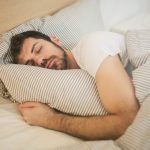Can I Take Xanax (alprazolam) For Sleep?

The collective term sleep disorder refers to conditions that affect sleep quality, timing, or duration and impact a person’s ability to properly function while they are awake. These disorders can contribute to other medical problems, and some may also be symptoms of underlying mental health issues.
Data indicate that more than one-third of adults in the United States report getting fewer than 7 hours of sleep in a 24-hour period. More than 70 percent of high school students report getting fewer than 8 hours of sleep on weeknights.
Most people occasionally experience sleeping problems due to stress, hectic schedules, and other outside influences. However, when these issues begin to occur on a regular basis and interfere with daily life, they may indicate a sleeping disorder.
Depending on the type of sleep disorder, people may have a difficult time falling asleep and may feel extremely tired throughout the day. The lack of sleep can have a negative impact on energy, mood, concentration, and overall health.
What is Xanax (alprazolam)?
Xanax is a brand of alprazolam, a powerful benzodiazepine that is used to treat anxiety and panic disorders by decreasing abnormal excitement in the brain. The medication comes in the form of a tablet that quickly dissolves in the mouth, an extended-release tablet, or a concentrated oral solution. Generic Xanax comes in different shapes, colors, and sizes.
Benzodiazepines can have therapeutic anti-anxiety, anti-convulsant, muscle relaxing, and sedative effects. Xanax works by increasing the effects of a brain chemical called gamma-aminobutyric acid (GABA), which promotes calmness and produces a relaxed feeling. The drug decreases the level of excitement in the brain to treat anxiety and panic disorders.
Alprazolam is among the most prescribed benzodiazepine drugs in the U.S. and is among the benzodiazepines most often found in the illegal market, according to the Drug Enforcement Administration.
Xanax is often prescribed for mental health disorders related to anxiety. It can be used to treat general anxiety, panic disorder, social anxiety disorder, and phobias. It can also be used to treat seizures. For people who suffer from anxiety, it can create a sense of relief to focus on their lives without issues of anxiety or phobias plaguing them. When used as prescribed, it can calm people down and make them feel relaxed.
Xanax can also reduce physiological symptoms of anxiety and fear, such as a racing heart or hyperventilation. These drugs are so often prescribed because they work well on anxiety and they’re cheap.
However, many people use Xanax for nonmedical reasons, taking it in larger doses or more frequently than prescribed because it can create a euphoric feeling, especially at higher doses. Xanax tends to start acting quickly after a person takes it, and the euphoric effects of the drug will usually manifest themselves within about an hour after taking it.
A tendency has grown in some social circles to view Xanax, as a type of “alcohol” in pill form. It’s become socially acceptable among these groups of friends to get together and share Xanax with one another. Of the 30.5 million people who used benzos in 2015, 17.1% misused them. Misusing Xanax or combining it with other substances like alcohol can amplify its effects, but the results can also be deadly.
Along with recreational use, many people rely on Xanax to deal with issues like situational anxiety without having to commit to therapy, which can be expensive and time-consuming. Xanax is popular in America, for example, because there is a tendency for people to love things that are looked at as a quick fix. Xanax isn’t a long-term medication, so some people “take it when they need it” for relief. The temporary relief they feel can help in a fast-paced world with constant exposure to negative world news, stressful jobs, and uncertainty.
Can I take Xanax (alprazolam) For Sleep?
Yes, some doctors still prescribe Xanax to treat insomnia even though it was not designed as a sleep aid. In the early 1970s, Xanax was widely prescribed to treat insomnia because of its ability to cause drowsiness as a side effect. However, because of its short half-life and high risk for dependence and addiction, it cannot be used for the long-term management of sleeping disorders.
A 1987 study that involved the administration of alprazolam to people with difficulty falling asleep reported that the patients experienced noticeable sleep improvements after using alprazolam. However, the effects did not last. By the end of one week of alprazolam use for sleep, the researchers stated that the medication had “lost about 40 percent of its efficacy.”
Xanax is rarely prescribed anymore for treating this sleep disorder and it is no longer recommended because it is not a long-term treatment for insomnia. However, if your sleeping problems are caused by anxiety, doctors can still prescribe Xanax to help you sleep better. Anxiety is frequently connected to sleeping problems. Excess worry and fear make it harder to fall asleep and stay asleep through the night. Sleep deprivation can worsen anxiety, spurring a negative cycle involving insomnia and anxiety disorders.
How to take Xanax (alprazolam) for sleep
The recommended starting dose of alprazolam is 0.25 mg to 0.5 mg three times a day. The dose of this medicine will be different for different patients. Follow your doctor’s orders or the directions on the label. The following information includes only the average doses of this medicine. If your dose is different, do not change it unless your doctor tells you to do so.
The amount of medicine that you take depends on the strength of the medicine. Also, the number of doses you take each day, the time allowed between doses, and the length of time you take the medicine depend on the medical problem for which you are using the medicine.
Can I take Xanax (alprazolam) and Melatonin together?
No, avoid taking Xanax and melatonin together because it can temporarily increase your risk of side effects. Melatonin supplements are frequently used as a sleep aid. They help you fall asleep, improve sleep quality, and increase sleep duration. However, they don’t appear to be as effective as many other sleep medications. Sleep isn’t the only body function melatonin affects.





